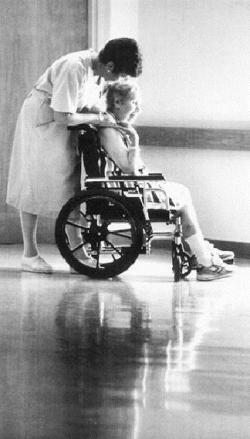 read pdf version
read pdf version

Alberta's crisis in long-term care
Auditor general's findings must be acted upon now
Carol Wodak
Freelance
May 22, 2005
I was one of the citizens who signed the request for the
auditor general's audit of our long-term care system. His
report has served to encourage other people, who thought
they were alone, to speak out.
This is no surprise to me. In the eight years I have been
intimately concerned with the system, I have also been
aware of the climate of fear and hopelessness in which
residents and their families have been living.
It is astonishing to me how many people tell me I've been
very brave to expose my mother and myself to public
expressions of concern.
I hope we can now start to effect solutions. The auditor-
general's recommendations must not be "taken under
consideration" as our government suggests; they must be
implemented. The recommendations repeat those that have
been presented to this government before by concerned
citizens.
And they don't go far enough: the fundamental issue is
acknowledging that our disabled and chronically ill patients
are indeed valued citizens for whom we collectively have
the responsibility of ensuring care and comfort. The real
CREDIT: The Canadian Press, File
measure of success is how well these citizens do with our
Long-term-care facilities need more
care.
staff to properly care for patients.
The "interim improvements" -- the additional funding in the last budget
(which will buy four minutes
per day of additional care time for each resident) and the announcement of additional
inspections --
won't do it.
We need immediately to restore staffing levels to provide appropriate care.
This includes reversing
the de-skilling of jobs, restoring support staff (physio- and occupational therapists,
recreation and
housekeeping staff), and offering part-time and casual staff real positions.
We cannot afford not to do
this.
We need -- immediately -- an independent inspection agency, like that in Britain,
where people can
easily and safely report concerns, and which will have sufficient authority to inspect facilities and
quality of care, order remedies, and report publicly on its activities.
We need to rewrite the standards of care, establish accountability, monitoring, and inspection
responsibilities and generally create a foundation for a comprehensive and seamless long-term-care
system under one responsible ministry.
We need to improve planning to ensure that we have the facilities and services where and when they
are needed, rather than those we want to afford, and we need much better assessment of needs at
every step of the service from placement to individual-care planning.
We need to develop alternatives to the institutional settings to provide appropriate care
environments. And we need to protect the residents of these facilities from the use of anti-psychotic
and anti-depressant drugs prescribed and administered without any requirement for informed consent
or monitoring of side-effects, simply to control dementia behaviours to reduce care needs.
It is ludicrous to consider that the provision of health services, the design and maintenance of the
facility, and room and board are separable in the care of persons with serious and progressive
conditions.
The regional health authorities have served to distance the ministry of health and wellness from the
problems, but cannot save it from the responsibility for the delivery of care. The government has a
moral responsibility to adequately resource this initiative -- as a priority.
You'll notice that I said "we." The users of the system have been excluded from its design, operation,
and evaluation. That is not acceptable. Health Minister Iris Evans has to find a way to ensure that
"we" have a say in all these decisions, from the beginning of the process.
It is essential to include stakeholders whose only vested interest is the well-being of the residents. I
also suggest ongoing funding for autonomous family councils, in an amount equal to that provided as
fees to the Alberta Long-Term Care Association (one way or another, we're funding that industry
lobby group).
But most importantly, we must deal with the continuing problems of physical and emotional abuse
and neglect, including inappropriate use of drugs, which have or may have led to misery, injury,
illness, and premature death of residents in the care of our systems.
Many of these incidents have been reported by individuals, or documented by groups, to various
provincial government ministries, officials, and MLAs, including the premier.
And many more have gone unreported, because of the climate of fear and hopelessness. It is
unconscionable that any indication of such a problem should simply be filed away and ignored, as
though what happens to these people simply doesn't matter.
There must be an independent investigation, or perhaps a forensic audit, and a public inquiry to
identify the many ways that long-term residents experience violence, abuse and neglect in their lives;
the barriers and factors that prevent disclosure of their victimization; and the remedies and responses
required on several fronts to address this urgent and distressing situation.
Carol Wodak's mother lives in a long- term-care facility. Her concerns about the long-term-care
system have evolved since her mother's first disabling stroke, and led to the request for an audit
submitted to the auditor general by herself and others in 2003
© The Edmonton Journal 2005
